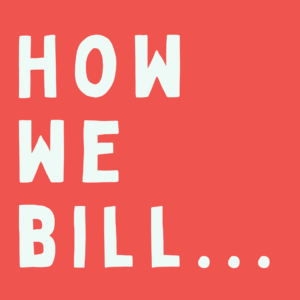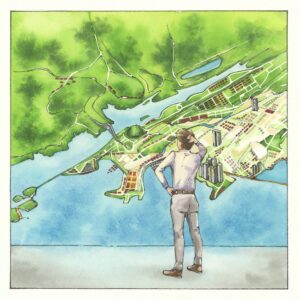One thing I love about some of the active Panama expat Facebook groups is how you can observe trends in the way people are thinking about and discussing Panama relocation. Over the last few months, one topic that has gained traction is the Panama Professional Visa program.
And it’s easy to see why people are talking about this online. This visa program provides a path to becoming a permanent resident in Panama based on a foreign college degree – so long as the applicant’s degree is not tied to a protected profession specifically reserved for Panamanians. People like this one because it doesn’t require a major investment, and you don’t have to be the beneficiary of a pension or retirement plan. It also allows qualifying applicants to apply for a work permit.
All that is the good news.
The not-so-good news is that you’ll have to spend some time and money having your degree validated with the University of Panama before you can be 100% sure of your eligibility. This adds an element of uncertainty to the residency application process, which can be pretty annoying when you are trying to make your relocation plans.
In this article, we will walk you through the ins and outs of securing legal residency in Panama via the Foreign Professional Visa. We’ll also go through the most notable pros and cons of this residency program, so you can decide whether Panama’s Foreign Professional Visa is the best option for you to become a Panama resident.
Validation of your Foreign Degree for the Panama Professional Visa
Just like the Panama Friendly Nations Visa program, the Professional Visa initially grants a 2-year residency, with an option to apply for permanent residency upon renewal. But the Foreign Professional Visa is different from the Friendly Nations Visa program in 2 fundamental ways:
First – the Professional Visa is not limited to applicants holding certain passports like the Friendly Nations Visa.
Second – the main requirement to qualify for the Panama Professional Visa is a university-level degree that does not fall within a category that is reserved for Panamanians.
So, to begin the process, you’ll need to ensure that your university diploma is recognized in Panama. This typically involves validating your degree through the University of Panama. For an undergraduate or bachelor’s degree, this is a 1-step process called “equivalence” (or “equivalencia” in Spanish), in which the University assesses the educational standards of your studies. Meanwhile, a post-graduate degree (such as a master’s degree) goes through a 2-step process: equivalence, followed by “homologation” (or “homologación” in Spanish).
This is important if you hold multiple degrees, because the 2-step process for a post-graduate degree is very likely to take longer than the 1-step process for an undergraduate degree. The 2-step process also requires an additional USD $500 payment to the University of Panama. So, if you have multiple degrees that could allow you to qualify, then applying based on a bachelor’s degree is likely to save you some time and money.
But even more important is to consider whether your degree might be associated with a list of professions that are specifically reserved for Panamanians. For example, you wouldn’t be able to qualify for a Panama Professional Visa based on your foreign law degree, because only Panamanians are permitted to practice law in Panama.

Assembling your Application Package
As I said, before submitting your residency application for the Foreign Professional Visa you’ll need to validate your university degree with the University of Panama. More specifically, you’ll need to submit:
- a copy of your valid passport;
- a copy of your university diploma, bachelor’s, master’s, or doctorate degree;
- an official publication from the institution that granted the degree, containing information on the academic program and curriculum;
- an official copy of your transcripts; and
- any other document or work product, such as a thesis or research project, that can contribute to a better evaluation of the scope and quality of your studies.
Once the University of Panama has validated your degree, we can start the residency application. You’ll need to prepare the following documents for the residency application package:
- a copy of your valid passport;
- a second form of ID, such as a driver’s license;
- a health certificate; and
- a federal police report showing whether you have any criminal record.
- The validated degree, which should already have gone through the equivalencía process (and also the homologación process, in case of a post-graduate degree).
The Panama Professional Visa also allows qualifying applicants to obtain residency for a spouse or dependent children. If you are applying with your family, then you’ll need to add another couple of additional documents to your application package:
- a federal police report for the main applicant’s spouse and any dependent children over 18 years old;
- a certified copy of your marriage license;
- a certified birth certificate for any dependent children; and
- a bank reference letter from a local bank indicating that the applicant has a balance of at least USD $5,000 in a bank account with their institution. Be sure to read our article about opening a bank account in Panama.
And since we are making lists, let me add another few bullet points that you should know about gathering all of these documents for your application:
- Federal police report(s) must be issued within 6 months before submitting your application. For example, if you are coming from the US, you will need to provide an FBI report to satisfy the police record requirement. And if you are coming from Canada, you should provide an RCMP report.
- Your marriage certificate must also be freshly issued within 6 months prior to submitting your application. So most people will need to contact a government office in the jurisdiction where they were married to request an updated copy.
- Your kids’ birth certificates do NOT have to be freshly issued.
- All of the docs related to your university-level degree should be apostilled or otherwise authenticated when you submit them for the equivalencia process and the homologación process.
- The police report(s), marriage certificate, and birth certificate(s) will also need to be apostilled or otherwise authenticated in the country of issuance. And while the birth certificate does not have to be freshly issued, the apostille should be applied within 6 months prior to submitting your residency application.
- You will need to cut a check of USD $250 in favor of the National Treasury of Panama for each person applying in your family.
- You will also need to cut a check of USD $800 to Panama’s Immigration Office for each applicant over 12 years old.
The Residency Application Process
Once your application package is complete, we will meet for you to sign a power of attorney and a couple of other documents that we will prepare for you. You’ll also give us your passports, which we will register at the immigration office that day or the following day. About 3 business days after that, you will go to the immigration office to take your pictures for the temporary (6-month) residency card.
The main thing to consider here is that you should plan to be in Panama for at least 5 business days to start the residency application process. There isn’t really all that much that you´ll have to do during that time, but you will not have your passports!
The temporary residency permit will allow you to stay in Panama, or to come and go as you please, during the approximately 6 months that your Foreign Professional Visa is being processed. Once it is approved, you will need to return to Panama – this time to take pictures for your 2-year provisional residency permit. But if you aren’t in Panama, then you don’t have to come running back immediately when your Visa is approved. Actually, you have up to 2 years from the date of your last departure from Panama to take your pictures for your 2-year provisional residency permit.
One more thing – you will have the option of applying for a permanent residency permit when your 2-year provisional residency permit comes up for renewal. Actually, we can start that process within 3 months before your 2-year residency card expires.

What’s to Love About this Visa
Here are a few things our clients really like about this type of visa:
No lifetime pension or retirement benefit requirement
Unlike the Pensionado Visa, the Foreign Professional Visa doesn’t require that you receive a minimum monthly income from a pension, social security, retirement plan, or similar lifetime income.
Applicants can qualify for a Panama work permit
Again, in contrast to the Pensionado Visa, applicants who qualify for the Panama Professional Visa can also obtain a work permit through the Ministry of Labor. This opens up opportunities for employment with a Panamanian company or entrepreneurship in Panama, further enhancing the appeal of this visa program.
Available to everyone
Unlike the Friendly Nations Visa application, the Panama Professional Visa isn’t limited to applicants with specific passports.
No major investment requirement
The Foreign Professional Visa also offers a path to permanent residency without making a huge investment in real estate or a time deposit at a local bank. Understandably many people would prefer to have their boots on the ground in Panama before considering such a large investment.
What’s Not to Love?
Ok, so what’s the downside? Well, there are really just 2 things about the Panama Professional Visa that make us raise our eyebrows a bit.
First, while the Professional Visa is technically available to applicants of any nationality, this is not really true as a practical matter. That’s because anyone who applies for this visa (or most of the other residency visas in Panama) will have to physically be in Panama to launch the application process at the immigration office. This usually requires being able to qualify for a tourist visa to be able to enter the country in the first place. And obtaining a tourist visa can still be prohibitively difficult for would-be applicants from some countries.
Second, the separate equivalencia and homologación processes mean that applicants must interface multiple times with Panamanian government bureaucracy. And while the residency application process is pretty straightforward and predictable, the degree validation process can add some uncertainty to the overall process. It might take 3 months, 6 months, or 9 months…
Also, you won’t really know how the University of Panama will interpret the information you provide for your degree until you actually go through the process. Or, an applicant could be invited to supplement their degree with additional coursework in Panama to get past the equivalencia process. These sorts of wild cards are not very convenient when you are trying to plan your family’s relocation.
Bottom Line?
In conclusion, the Panama Foreign Professional Visa residency program offers legal residency and ultimately a path toward obtaining a permanent residence permit in Panama. With its flexible requirements and numerous benefits, it’s no wonder that this visa program is gaining popularity among individuals seeking to make Panama their new home.
But would-be applicants should be aware that the Panama Professional Visa involves more steps than some of the other residency programs. This makes for a lengthier and less certain immigration process. That’s because the University of Panama must validate the applicant’s foreign degree before the applicant can even begin the residency application process. If you’re considering applying for a Professional Visa, be sure to consult with a Panama immigration lawyer to ensure a smooth and successful application process.
If you enjoyed this article (or even if you hated it), be sure to send us an email at info@theindependentlawyer.com.







